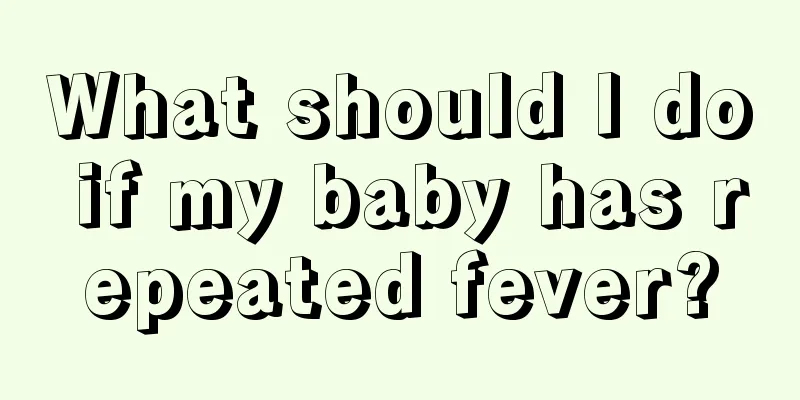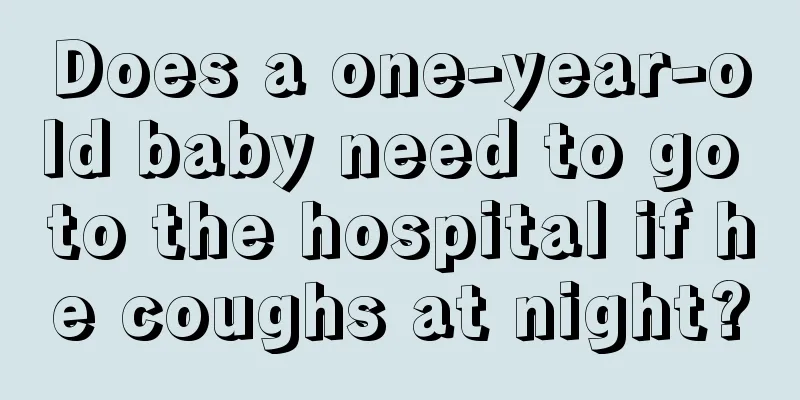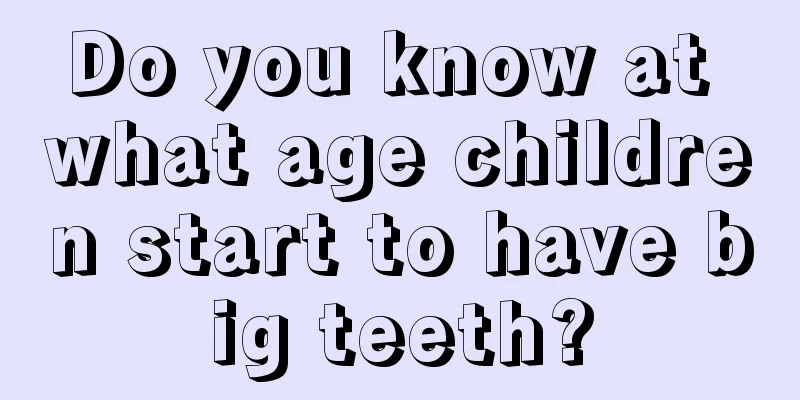What should I do if my baby has repeated fever?

|
We all know that children will always encounter some health problems in the process of growing up. Among them, due to the rapid growth and development of children's bodies, their immunity is particularly poor, so they are always prone to diseases such as colds and fevers. Once a child has a fever, parents will always pay special attention, especially repeated fevers, which can easily stimulate the child's brain. In this case, we must master the method and make timely adjustments. Let's learn about what to do if the baby has repeated fevers. What should I do if my baby has repeated fever? Some children have a fever for several days. If they need to reduce the fever, when is the best time to do it? Should physical cooling be performed first? Professor Hou said that a child's fever is the body's response to the disease, and it plays a positive role in mobilizing the body's disease prevention ability. As the primary disease improves, the body temperature will gradually return to normal, and antipyretic drugs can be taken orally at home. Parents should not be anxious when their children have a fever. If the child's temperature is below 39°C and the child is in good mental state, oral antipyretic drugs can be used for treatment. It should be noted that antipyretic drugs achieve the purpose of reducing fever through sweating. If the temperature does not go down after taking the medicine, the child can be fed hot water to induce sweating, or given a hot water bath to help reduce the fever, or repeatedly wipe the child's back, armpits, groin, limbs skin and other areas rich in blood vessels. If the child's temperature exceeds 39°C, and he is lethargic or has a history of high fever convulsions, he can take oral antipyretics at home and then be sent to the hospital for treatment in time. It is not advisable to use antipyretics and alcohol baths for newborns. You can take off their outer clothes or reduce the amount of quilts to dissipate heat, or use hot water baths to cool down. Sometimes children react too strongly to illness and antipyretics are not effective, so hormones can be used to reduce fever. Parents should also make sure that their sick children get enough rest in bed to reduce physical exertion. After having a fever, the child has a poor appetite. He can eat some liquid food, eat less or no greasy food, drink more water, and add a small amount of salt to promote sweating, which is beneficial to lowering body temperature and excretion of toxins and preventing dehydration. - Do not take antipyretics at will Normally, the family should have a thermometer and antipyretic drugs for emergency use. Children with fever should have their temperature measured every hour. Antipyretic drugs include ibuprofen, chlorpheniramine, pediatric antipyretic suppositories, etc. Traditional Chinese medicine can also be used, but because traditional Chinese medicine has a slow antipyretic effect, Professor Hou Wei said that it is not recommended for parents to use traditional Chinese medicine, especially for reducing fever in infants and young children. Do not take more antipyretics or increase the dosage. Commonly used antipyretic drugs for children include acetaminophen (such as Tylenol, Benadryl, etc.), ibuprofen (such as Motrin, Tone, etc.), aspirin and lysine, etc. These are all antipyretic and analgesic drugs. Acetaminophen has a fast onset of action, strong effect and high safety, so it is the first choice. Ibuprofen reduces fever quickly and steadily, and the fever-reducing effect lasts for 6 to 8 hours. It is best used in children over 6 months old. It can be used alone or with acetaminophen simultaneously or alternately. It is more convenient to give infants and young children oral liquid preparations of antipyretics. Older children can take the granules. Since most vaccines are biological preparations, children will have fevers of varying degrees after vaccination, which is a normal reaction. However, if the body temperature exceeds 38°C, antipyretic drugs will be needed. The use of antipyretic drugs will not affect the effectiveness of the vaccine. Before your child is vaccinated, you must pay attention to his or her health status. If he or she has respiratory infections, diarrhea or other diseases, vaccination should be postponed. Otherwise, adverse reactions such as fever, vomiting, and rash are likely to occur. The above is an introduction to what to do if your baby has repeated fever. After understanding it, when the child has a fever, parents must monitor the baby's body temperature at any time. Once the fever is above 38.5 degrees, they must go to the hospital for examination in time. In addition, when the child has a fever, they must be physically cooled down, and they can help the child take a hot bath. Or wipe your body with alcohol. Remember not to take medicine blindly. You must go to the hospital for examination and then take the right medicine. |
<<: What to do if your child loses a tooth and bleeds
>>: Is it okay for children to lose their teeth late?
Recommend
What to do if nephrotic syndrome relapses in children
For many families, the health of their children i...
What are the treatments for oral herpes in children?
Oral herpes in children is an oral disease. Its m...
Swimming pools are prone to pink eye in hot weather. Four aspects of pink eye care for babies
Right now, the weather is hot, and more people ar...
The disadvantages of using bottle straws for a long time after the baby is one year old
Nowadays, many parents frequently use pacifiers a...
Is it normal for a newborn to pull milk clots?
In our lives, there are many newborns who will ha...
What foods are good for children with liver fire?
If a child has excessive liver fire, parents shou...
What should I do if my child sweats a lot?
Maybe the heavy sweating that many children have ...
How often should a newborn baby drink milk?
Newborn babies are relatively fragile, their bodi...
What are the children's health exercises that can protect the eyes?
The content of children's health exercises is...
What are the causes of peritoneal effusion in newborns?
Parents need to pay attention to neonatal ascites...
The child walks with his left foot turned inward
In life, many children have different postures wh...
What to do if your child suffers from anorexia
Many times, children always don’t like to eat, an...
What to do if your child has itchy eyes
Children's bodies are relatively weak and the...
What causes rough skin in children?
Skin problems are not only a headache for adults,...
How to grow taller for children
Children are the spiritual sustenance of their pa...









